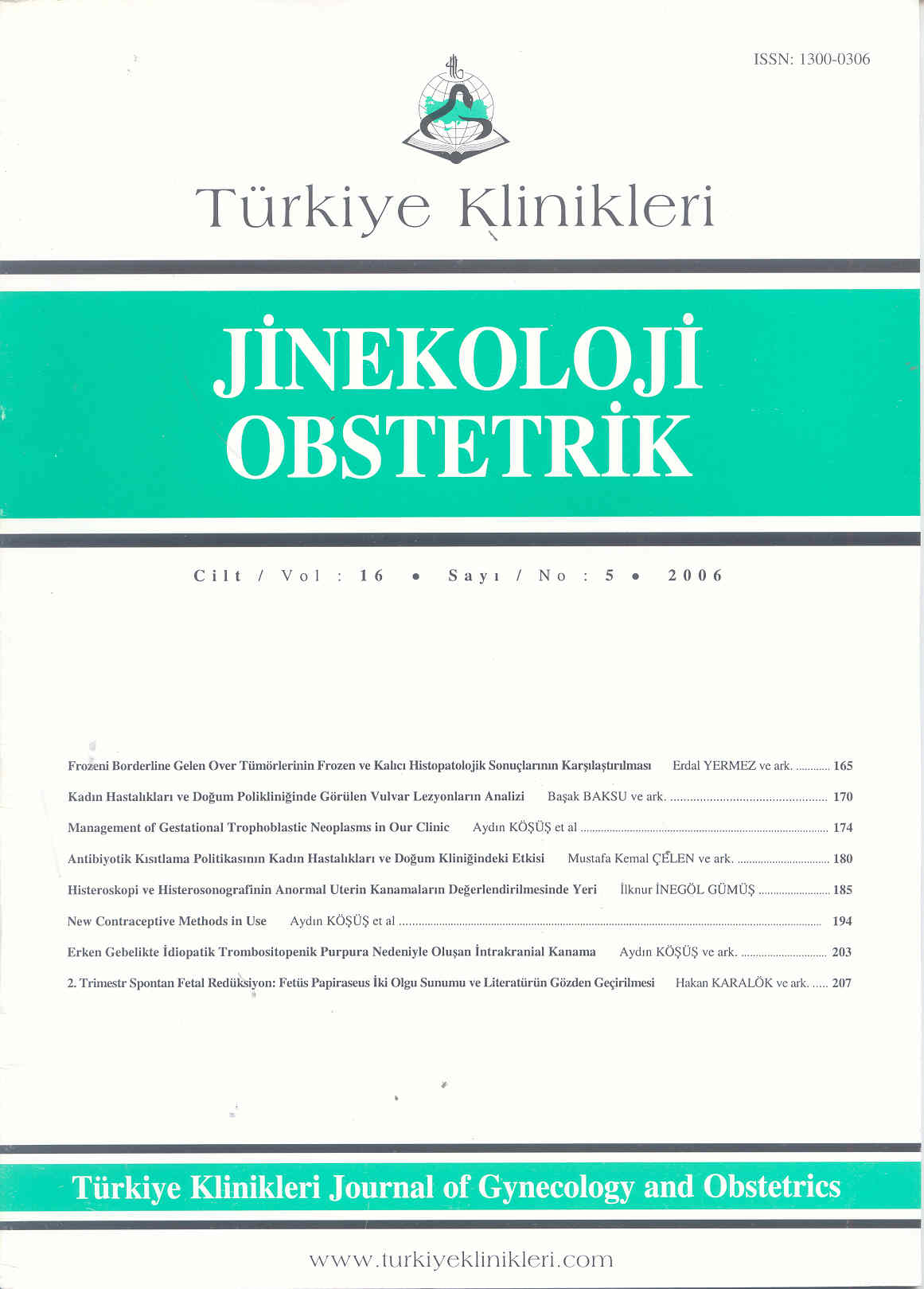Open Access
Peer Reviewed
ORIGINAL RESEARCH
3307 Viewed1216 Downloaded
The Effect Of Antibiotic Restriction On Gynecology And Obstetrics Clinics
Antibiyotik Kısıtlama Politikasının Kadın Hastalıkları ve Doğum Kliniğindeki Etkisi
Turkiye Klinikleri J Gynecol Obst. 2006;16(5):180-4
Article Language: TR
Copyright Ⓒ 2025 by Türkiye Klinikleri. This is an open access article under the CC BY-NC-ND license (http://creativecommons.org/licenses/by-nc-nd/4.0/)
ÖZET
Amaç: Çalışmanın amacı; kadın Hastalıkları ve Doğum Kliniğinde Sağlık Bakanlığı'nın 2003 Nisan ayında uygulamaya koyduğu antibiyotik kısıtlama politikası öncesi ve sonrası ardışık 3 günlük antibiyotik kullanım yoğunluğunu, maliyeti ve enfeksiyon hastalıkları konsültasyon hizmetinin etkisini karşılaştırmaktır. Gereç ve Yöntemler: Kadın Hastalıkları ve Doğum Kliniği ardışık 3 günlük sürede, kısıtlama öncesi ve sonrası olarak çalışma kapsamına alındı. Bu yeni uygulamayla Piperasilin-tazobaktam, tikarsilin-klavunat, meropenem, seftazidim, imipenem, glikopeptid ve amfoterisin-B gibi ilaçların kullanımı enfeksiyon hastalıkları konsültasyonuna bağlanmıştır. Antibiyotik kullanım yoğunluğu "antibiyotik tüketim indeksi" (ATİ) ile ölçülmüştür. Bulgular: Yeni uygulama öncesi yapılan ardışık 3 günlük çalışmada kadın hastalıkları ve doğum kliniğinin ATİ değeri 65.3 TGD/100 yatış günü (YG) iken yeni uygulama sonrası ATİ 63.4 olarak bulundu. Kullanımında kısıtlama getirilen antibiyotiklerin tümünde ATİ değeri azaldı. Kısıtlama öncesi 3 günlük dönemde kadın hastalıkları ve doğum kliniğine yapılan enfeksiyon hastalıkları konsültasyonu sayısı 1 iken, kısıtlama sonrası dönemde yapılan konsültasyon sayısının 6 olduğu saptandı. Antibiyotik kısıtlamasına gidilirken hastane enfeksiyonu gelişimi oranında da bir artış görülmedi. Üç günlük kısıtlama sonrası kullanılan antibiyotiklerin maliyetinden 670.00 YTL tasarruf elde edildi. Sonuç: Kadın hastalıkları ve doğum Kliniğinde, kısıtlanan antibiyotiklerin kullanımının enfeksiyon hastalıkları konsültasyonunun arttırılması ile azaldığı görüldü.
Amaç: Çalışmanın amacı; kadın Hastalıkları ve Doğum Kliniğinde Sağlık Bakanlığı'nın 2003 Nisan ayında uygulamaya koyduğu antibiyotik kısıtlama politikası öncesi ve sonrası ardışık 3 günlük antibiyotik kullanım yoğunluğunu, maliyeti ve enfeksiyon hastalıkları konsültasyon hizmetinin etkisini karşılaştırmaktır. Gereç ve Yöntemler: Kadın Hastalıkları ve Doğum Kliniği ardışık 3 günlük sürede, kısıtlama öncesi ve sonrası olarak çalışma kapsamına alındı. Bu yeni uygulamayla Piperasilin-tazobaktam, tikarsilin-klavunat, meropenem, seftazidim, imipenem, glikopeptid ve amfoterisin-B gibi ilaçların kullanımı enfeksiyon hastalıkları konsültasyonuna bağlanmıştır. Antibiyotik kullanım yoğunluğu "antibiyotik tüketim indeksi" (ATİ) ile ölçülmüştür. Bulgular: Yeni uygulama öncesi yapılan ardışık 3 günlük çalışmada kadın hastalıkları ve doğum kliniğinin ATİ değeri 65.3 TGD/100 yatış günü (YG) iken yeni uygulama sonrası ATİ 63.4 olarak bulundu. Kullanımında kısıtlama getirilen antibiyotiklerin tümünde ATİ değeri azaldı. Kısıtlama öncesi 3 günlük dönemde kadın hastalıkları ve doğum kliniğine yapılan enfeksiyon hastalıkları konsültasyonu sayısı 1 iken, kısıtlama sonrası dönemde yapılan konsültasyon sayısının 6 olduğu saptandı. Antibiyotik kısıtlamasına gidilirken hastane enfeksiyonu gelişimi oranında da bir artış görülmedi. Üç günlük kısıtlama sonrası kullanılan antibiyotiklerin maliyetinden 670.00 YTL tasarruf elde edildi. Sonuç: Kadın hastalıkları ve doğum Kliniğinde, kısıtlanan antibiyotiklerin kullanımının enfeksiyon hastalıkları konsültasyonunun arttırılması ile azaldığı görüldü.
ANAHTAR KELİMELER: Anti-bakteriyel ajanlar, kros enfeksiyon, maliyetler ve maliyet analizi
ABSTRACT
Objective: The study was designed to compare the frequency, cost and effect of the enfectious diseases specialist's consultation related to the subsequently use of the antibotics for three days before and after the antibiotic restriction policy which legislated by Health Ministry on April 2003, in the gynecology and obstetrics clinic. Material and Methods: The gynecology and obstetrics clinic was included into the study for the use of the antibiotics during 3 consecutive days before and after the restriction policy related to the antibiotics usage. According to this new antibiotic restriction policy a prior consultation with an infectious diseases specialist is requered for the drugs such as piperacillin-tazobactam, ticarcillin-clavulanate, meropenem, ceftazidime, imipenem, glycopeptide, and amphotericin B. The intensity of the antibiotic usage was calculated with 'antibiotic consumption index' (ACI). Results: Antibiotic consumption index was calculated as 65.3 TGD?/100 YG for three consecutive days before restriction policy while it was 63.4 TGD/100 YG after the restriction policy at the gynecology and obstetrics clinic. Antibiotic consumption rate was lowered in all antibiotics which their usage was restricted. While the consultation with an infection diseases specialist was 1 before the restriction, it was detected to be 6 after the restriction policy.There was not any increment on hospital infection progression ratio during antibiotic restriction period. After 3 days of the restriction 670.00 YTL (New Turkish Lira) saving was obtained from the used antibiotic cost. Conclusion: The usage of the restricted antibiotics was decreased at the gynecology and obstetrics clinic by way of the increased consultation with an infection diseases specialist.
Objective: The study was designed to compare the frequency, cost and effect of the enfectious diseases specialist's consultation related to the subsequently use of the antibotics for three days before and after the antibiotic restriction policy which legislated by Health Ministry on April 2003, in the gynecology and obstetrics clinic. Material and Methods: The gynecology and obstetrics clinic was included into the study for the use of the antibiotics during 3 consecutive days before and after the restriction policy related to the antibiotics usage. According to this new antibiotic restriction policy a prior consultation with an infectious diseases specialist is requered for the drugs such as piperacillin-tazobactam, ticarcillin-clavulanate, meropenem, ceftazidime, imipenem, glycopeptide, and amphotericin B. The intensity of the antibiotic usage was calculated with 'antibiotic consumption index' (ACI). Results: Antibiotic consumption index was calculated as 65.3 TGD?/100 YG for three consecutive days before restriction policy while it was 63.4 TGD/100 YG after the restriction policy at the gynecology and obstetrics clinic. Antibiotic consumption rate was lowered in all antibiotics which their usage was restricted. While the consultation with an infection diseases specialist was 1 before the restriction, it was detected to be 6 after the restriction policy.There was not any increment on hospital infection progression ratio during antibiotic restriction period. After 3 days of the restriction 670.00 YTL (New Turkish Lira) saving was obtained from the used antibiotic cost. Conclusion: The usage of the restricted antibiotics was decreased at the gynecology and obstetrics clinic by way of the increased consultation with an infection diseases specialist.
MENU
POPULAR ARTICLES
MOST DOWNLOADED ARTICLES





This journal is licensed under a Creative Commons Attribution-NonCommercial-NoDerivatives 4.0 International License.










